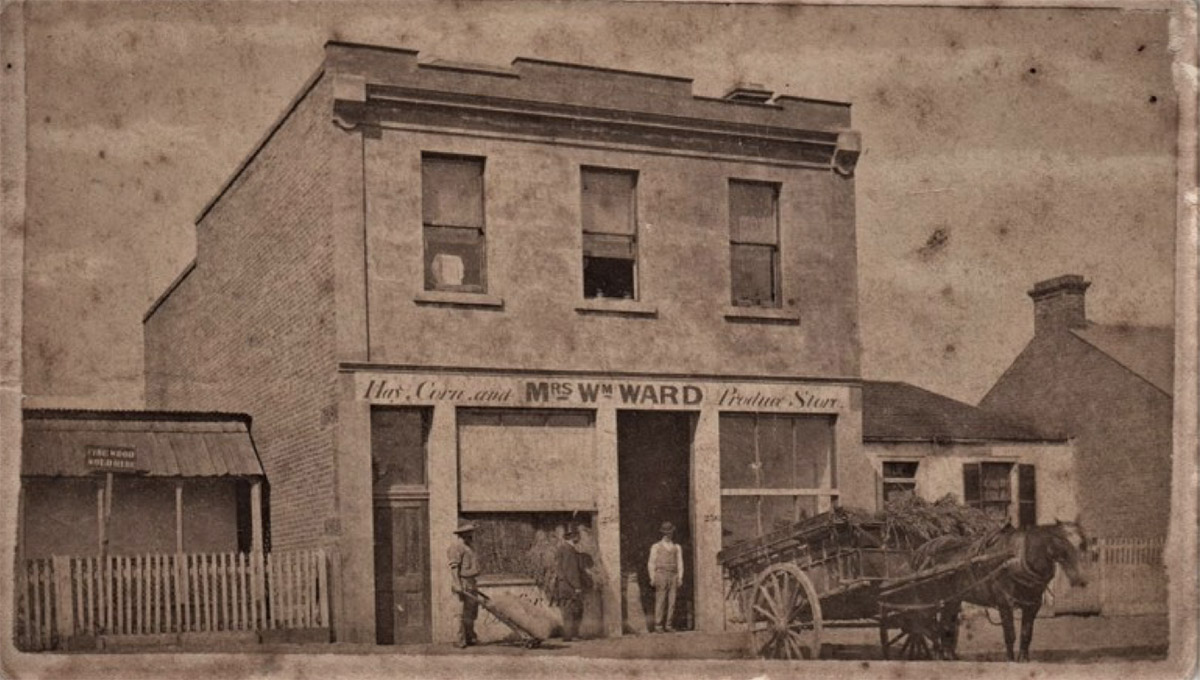January 4, 2022
FTA Food Solutions is part of the HSK Ward Group, a family business that stems back nearly 170 years and six generations, with its sister company Ward McKenzie. Since its humble beginnings in 1852, the family business is now a multinational importer, distributor and exporter.


Madaline Dunn chatted with David Ness, general manager of procurement and Tom Burgess, procurement specialist, who is also part of the sixth generation involved in the business, to gain insight into the company, pulse trends, and the future of plant protein in Australia.
Can you tell me a bit about the pulse crops you deal with and how the crops are looking so far this year?
Tom: Australia as a whole isn't a big bean producer, so a lot of our beans come out of North America. This is also due to government import requirements. Our major crops in terms of pulses include fava beans, chickpeas, lentils, and peas.
This year, you're talking to us in the very early days of harvest. We've had a lot of rain, which basically put the harvest on hold. This weekend and today have been the first real crack at getting the crops off the field. Originally, estimates were that we were going to have a really decent crop, and last year we had a really good crop as well. We were thinking of a 15% increase for chickpeas, so, a solid number, but with the substantial rain in New South Wales and Queensland, we don't really know where we're at. Victoria will be okay, maybe with some downgrading, but New South Wales and Queensland - we'll wait and see.
David: The rainfall has been phenomenal in the northern states. Unfortunately, a lot of New South Wales is currently under flood water, so it's definitely not ideal for pulse crops.
Tom: Yes, it's super disappointing because with North America having such a poor crop, there's been a lot of reliance and demand on Australia. Countries like China have started coming to us for their peas. Traditionally, it's been very Canada-focused but this year they're coming to Australia for their protein. We've got a lot of Southeast Asia that tend to buy from Türkiye and Canada, who are now pushing heavily on Australia. India is also coming into the market. So, it's disappointing that there are going to be some downgrades but we have to wait and see until everything is harvested and determine how good or bad the crop is. With Victoria, so far, so good.
What trends are you noticing regarding pulse crops?
Tom: Three or four years ago, Australia was in a horrific drought; there are lake beds you used to be able to walk on that are now 60 meters underwater. So, we've gone from very little water to substantial amounts of water, and that brings challenges with diseases, so there's a big push for more resilient crops.
Also, depending on the crop, this leads to smaller sizes of chickpeas or lentils. But, when you're faced with the challenge of not having a lentil or having one of a smaller size, growers and processors want something to be able to market, not nothing.
Another trend is that, with North America having such a poor crop, it's going to lead to more self-reliance. Even though we're a main producer, Australia buys a lot of peas and lentils, sometimes out of Canada - especially the more niche products. But, I think we're going to start seeing the market be more accepting of Australian products as well as growers who will be more accepting of growing them because they can probably get a bit more of a premium.
Can you tell me a bit more about the markets you serve regarding imports and exports?
Tom: For imports, we range across a big group of customers, and we also have the New Zealand side of our business. So, within those two businesses, our major customer bases are multinational industrial customers, eg. manufacturers, and we've also got large wholesalers; we do a lot of food service, too, so QSRs (KFC, McDonald's etc.). Basically, we don't pick and choose. We cast a wide net. Pet food manufacturing we also do a lot in. Then, on the flip side, with Mckenzie being 170 years in pulses, on the export side of things, a lot of our market is Southeast Asia, the Polynesian Islands, and the South Pacific.
David: Pet food manufacturers are big users of split peas and lentils. We also do retail repacking through the McKenzie plant, where we supply into retail.

A lot of money is being invested in plant protein in Australia. What role do you think pulses have to play there, and how is the landscape changing?
Tom: It's super exciting at the moment, and I think anyone involved in pulses in Australia is keen to have our own industry for protein. As I said before, we've had a big run locally of China buying a lot of our peas for their own protein requirements, so, if you think about that holistically and ethically, you're sending products to China to get processed, and then it's getting re-exported somewhere else - there's a lot of unnecessary movements there. So, just from that perspective, it's exciting that we're starting to do it for ourselves, where the products are grown, probably an hour away from where they're being processed.
There's lots of investment going into this area. I think there's one facility up and running and a few others in the pipeline.
CSIRO, our governmental research body here, has spent a lot of money - not only on the front end getting the plants up and running but on the backend too. I think they're partnering with a few companies in Australia to come up with new products that specifically use pulse protein.
We're also seeing lots of development around alternative milk; that's a massive industry here in Australia. Each week there's a new variety or company in the supermarket. It's unbelievable! Gone are the days when it was just soy and almond; now you've got soy, almond, hemp, chickpea - the range is amazing.
It's good for growers, too, because Australia has a pet food industry, where a lot of the lower-tier crops go, for example, grade two and grade three, and there is a discount for that. But, if we've got our own industry here that can process the lower grade or 'ugly' products into ready-to-use food, that's great for growers as the premium won't drop as drastically if there's substantial demand for the product. There'll be a lot less waste, too.
What are some of the ways you're reducing your carbon footprint as a company?
David: So, as a business, of course, we've got our standard policies around responsible and ethical sourcing and all those key initiatives that have been around for a while. However, we've also created a green team, which focuses solely on how we, as a company, can reduce our waste internally and how we can limit our impact across various parts of the business. So, everything from recycling to helping clear out the local lake. We've got a really strong focus on sustainability internally. Meanwhile, externally, we're in the process of looking into a few different ways that we can operate in a carbon-neutral way. We're not far off from launching one of our sectors as carbon-neutral and looking ahead we'll hopefully roll that out to other sectors so pulses, beans and lentils could be next.
We also work very closely with our suppliers to ensure that they are meeting our responsible sourcing policy and ask them what they are doing to reduce their carbon footprint. It's difficult at the moment with shipping lines running their boats at higher than average speeds, releasing higher amounts of pollution because they're trying to run the ships faster. If you look at the data, the average speed of a container ship at the moment is three times faster than it was three years ago because they're trying to get back and forth as fast as they can.
We've got a large footprint in Altona, so we're also looking at the installation of solar panels to reduce our carbon footprint. Everyone on the team has ideas, and we say that no idea is a bad idea. We're trying lots of different things out.
Looking forward, what's ahead for the business, and what's the future looking like for pulses?
Tom: From a pulses perspective, three or four years ago, Australia introduced a requirement which details that on retail packaging, the origin needs to be stated. So, you can go to any supermarket, and it'll say 'Product of Australia', or '20% of this product was sourced in Australia'. There's a premium on that here. So, there is a requirement for us to diversify what we're growing here regarding pulses, look at what we can grow ourselves, and not rely so heavily on North America. Especially when Canada and America have had serious droughts, we have an insurance policy to be able to grow our own varieties of lentils, beans, and chickpeas.
One of the Australian government agencies has just brought out a new variety of blue pea. So, hopefully, that's more resilient because it's been a challenge growing them here, and it could mean we sustainably grow and process green split peas, which we've sourced from the US historically.
There's also a little bit of a push on organics. In the early days, there was a big demand for it, and it seems like it has slowed a bit, but there's still demand there. When the export markets have a bit more demand, we could potentially see a greater push from the grower side as well as the co-op side but, at this stage, the majority of our volume goes to export as a country. We haven't had that demand push yet and organic hasn't grown as much as we thought it would.
David: There is a huge emphasis on provenance and natural foods. Beans, peas and lentils are seen as a natural food source, and not a huge amount of GMO has gone into that space, which allows people to feel more confident about consuming those products.
Additionally, given that the business has its roots going back six generations, starting out in 1852, there is a real focus on what we can do to help Australia and the world. We've grown that business over a long time, and one of the things that is a central focus is to make sure this business continues to grow and evolve, but also what can we do to look after future generations. We've already seen the impact that poor farming practices and environmental handling has had on the globe. We want to look into what can be done to fix that. We want to be a part of the solution.

David Ness / Australia / fava beans / Türkiye / Canada / Victoria / India / New Zealand / plant protein / alternative milk / pet food / blue peas
Disclaimer: The opinions or views expressed in this publication are those of the authors or quoted persons. They do not purport to reflect the opinions or views of the Global Pulse Confederation or its members.